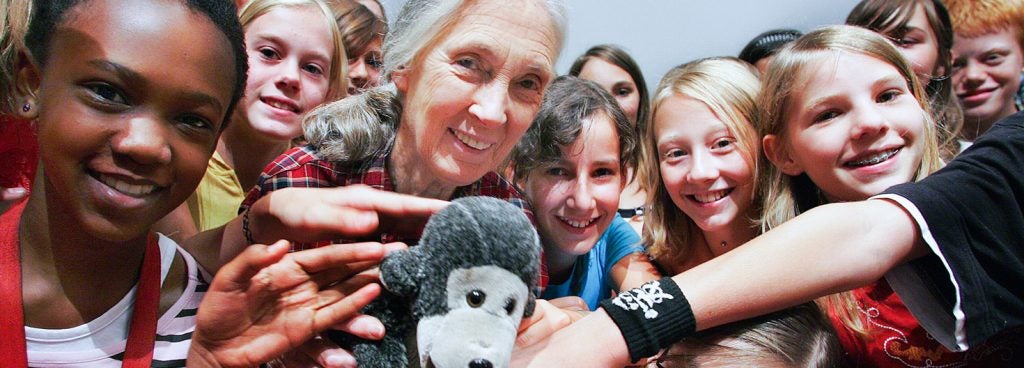
World-renowned primatologist Jane Goodall will speak to a capacity crowd on Tuesday, Sept. 19, at 7 p.m. at the Ryan Center in the second lecture of the Fall 2017 Honors Colloquium “Origins: Life, the Universe and Everything.”
Goodall is also an ethologist, anthropologist, United Nations Messenger of Peace, Dame Commander of the British Empire, founder of the Jane Goodall Institute and the Roots and Shoots, a community action program focused on grooming the next generation of environmental advocates. The topic of her talk, “Tomorrow & Beyond: 40 Years of the Jane Goodall Institute,” is part of a tour to promote the 40th anniversary of the institute. Goodall, 83, travels an average of 300 days a year educating the public on chimpanzees, environmental crises, conservation and activism. “The reason I go on doing it is because we don’t have much time left. We’re destroying the planet,” she said in a 2015 “New York Times” interview.
Goodall is considered the foremost expert on chimpanzees in the world. She has studied them and advocated for their protection for more than 50 years. Credited with changing the way the scientific community views chimpanzees, Goodall is the first scientist to have observed that they fashion and use tools, eat other mammals and even wage war.
As we await her arrival, we offer insights into what Goodall holds dear in her own words:
On chimpanzees
“For chimpanzees, like humans, have their history. Epidemics of polio and pneumonia, and a series of violent intercommunity interactions not dissimilar to human warfare, have ravaged their community. . . . There have been struggles for power every bit as dramatic as those surrounding the successions of human kings and dictators. And I have been privileged, since the early sixties, to record these facts — to compile the history of a group of beings who have no written language of their own.”
“Through a Window: My Thirty Years with the Chimpanzees of Gombe”
“. . . I do not, as many suppose, think of the chimps as extensions of my own family. I have the most profound regard and respect for them. I am endlessly fascinated by their behavior and I can spend hours, days in their company. Often I am asked if I prefer chimpanzees to humans. The answer to that is easy — I prefer some chimpanzees to some humans, some humans to some chimpanzees!”
“Through a Window: My Thirty Years with the Chimpanzees of Gombe”
On youths and the future
“When I address groups of youth I tell them that there is a lot we can do, each and every one of us, just by trying to make the world around us a better place. It can be very simple: we can make a sad or lonely person smile; we can make a miserable dog wag his tail or a cat purr; we can give water to a little wilting plant. We cannot solve all the problems of the world, but we can often do something about the problems under our noses.”
“Reason for Hope”
“. . . there is a vital energy in our youth that comes alive once they understand the problems and are empowered to take action. They see the difference they can make, and it feeds their determination and their energy. And it feeds mine, too.”
“Seeds of Hope”
“There is a powerful force unleashed when young people resolve to make a change.”
“Reason for Hope”
On her work
“I had gone to Gombe neither to prove that the chimps were better or worse than humans, nor to provide myself with a platform for making sweeping pronouncements about the ‘true’ nature of the human species. I had gone to learn, to observe, and to record what I observed; and I wanted to share my observations and reflections with others as honestly and clearly as I could.”
“Reason for Hope”
On human beings’ place in the world
“There are many windows through which we can look out into the world, searching for meaning. There are those opened up by science, their panes polished by a succession of brilliant, penetrating minds. Through these we can see ever further, ever more clearly, into areas that once lay beyond human knowledge. Gazing through such a window I have, over the years, learned much about chimpanzee behavior and their place in the nature of things. And this, in turn, has helped us to understand a little better some aspects of human behaviour, our own place in nature.”
“Through a Window: My Thirty Years with the Chimpanzees of Gombe”
On the dignity of animals
“If we accept that humans are not the only animals with personalities, not the only animals capable of rational thought and problem solving, not the only animals to experience joy and sadness and despair, and above all not the only animals to know psychological as well as physical suffering, we become (I hope) less arrogant, a little less sure that we have the inalienable right to make use of other life-forms in any way we please so long as there is a possible benefit for human animals.”
“Reason for Hope”
On her legacy
“I want to be remembered as someone who inspired others to follow their dreams.”
Jane Goodall to Diane Von Furstenberg, “InStyle Magazine”
